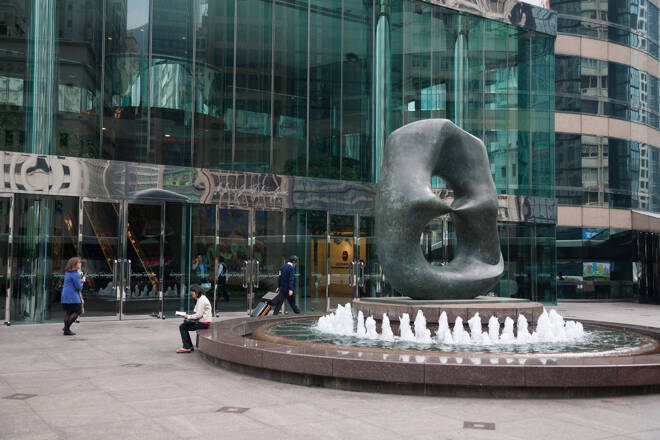Advertisement
Advertisement
Hang Seng Index, ASX 200, Nikkei 225 Index: Yields, Geopolitics, and PMIs to Guide Investors
By:
Private sector PMIs from Australia and Japan need consideration today. However, sentiment toward the Middle East conflict and yields remain focal points.
Key Insights:
- The ASX 200 and Nikkei 225 ended the Monday session in negative territory, while the Hong Kong markets were closed for Chung Yeung Day.
- On Monday, rising US Treasury yields and sentiment toward the Middle East conflict fueled risk aversion.
- The Middle East and yields will remain focal points on Tuesday, with private sector PMIs also in focus.
Overview of the Monday Session
On Monday, the ASX 200 and the Nikkei 225 spent another session in negative territory. The Hang Seng Index was closed for Chung Yeung Day.
The Asian markets tracked the US equity markets into negative territory. The Middle East conflict continued to weigh on market risk appetite. Fears of a wider regional conflict impacted the US equity markets on Friday.
A pullback in 10-year US Treasury yields failed to calm the markets, with yields remaining elevated by historical standards.
On Friday, the Dow fell by 0.86%, with the Nasdaq Composite Index and S&P 500 seeing losses of 1.53% and 1.26%. The losses set the tone for the Monday session.
There were no Asian region economic indicators to distract investors from the Middle East conflict. Another spike in 10-year US Treasury yields added to the market gloom.
The Tuesday Session: Private Sector PMIs and Yields
Overnight US economic indicators are unlikely to influence market risk sentiment on Tuesday. The US equity markets and US Treasury yields will likely guide investors early in the Asian session.
10-year US Treasury yields hit a fresh high of 5.020% on Monday before retreating to end the session at 4.852%. The pullback in yields provided late support for riskier assets
On Monday, the Nasdaq Composite Index gained by 0.27%. The Dow and S&P 500 recovered from heavier losses, ending the day down 0.58% and 0.17%.
News updates from the Middle East will continue to influence market risk sentiment. Investors will likely remain mindful of an escalation, with Iran a likely focal point.
However, economic indicators from Australia and Japan warrant consideration. Prelim private sector PMIs for October will give investors a bird’s eye view of the respective economies early in the fourth quarter.
Economists forecast weaker PMI numbers from Australia and softer services sector activity in Japan. Economists predict the Australian and Japanese manufacturing sectors to continue contracting in October.
In the Futures Markets, the ASX 200 was down 15 points, while the Nikkei 225 was up by 150 points.
ASX 200
The ASX 200 declined by 0.82% on Monday. RBA rate hike fears added to the negative sentiment. Rising bond yields continued to weigh on the tech sector. The S&P/ASX All Technology Index (XTX) declined by 0.51%. Mining stocks and the big four banks also ended the session in negative territory.
The Commonwealth Bank of Australia (CBA) and ANZ Group (ANZ) fell by 0.94% and 0.20%. Westpac Banking Corp (WBC) and The National Australia Bank (NAB) saw losses of 0.10% and 0.31%.
Mining stocks suffered heavy losses. Fortescue Metals Group (FMG) slid by 2.71%. Rio Tinto (RIO) and BHP Group Ltd (BHP) fell by 2.42% and 2.41%, with Newcrest Mining (NCM) declining by 2.02%.
Things were no better for the oil sector. Woodside Energy Group (WDS) and Santos Ltd (STO) ended the session down 3.22% and 2.50%.
Hang Seng Index
The Hong Kong markets were closed on Monday for Chung Yeung Day.
Nikkei 225
(Graph for reference purposes only)
The Nikkei declined by 0.83% on Monday.
Bank stocks Sumitomo Mitsui Financial Group (8316) and Mitsubishi UFJ Financial Group (8306) declined by 0.53% and 0.93%. The main components of the Nikkei had a mixed Monday session.
SoftBank Group Corp. (9984) and Fast Retailing Co (9983) fell by 2.00% and 1.57%. Tokyo Electron Limited (8035) and Sony Corp. (6758) ended the day down 0.10% and 0.92%, respectively.
KDDI Corp. (9433) bucked the trend, gaining 0.29%.
For upcoming economic events, check out our economic calendar.
About the Author
Bob Masonauthor
With over 28 years of experience in the financial industry, Bob has worked with various global rating agencies and multinational banks. Currently he is covering currencies, commodities, alternative asset classes and global equities, focusing mostly on European and Asian markets.
Advertisement
